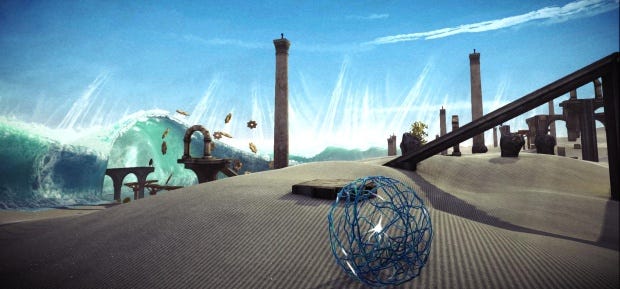Wot I Think: Mind - Path To Thalamus
Don't Mind If I Do
Spanish-born Mind: Path To Thalamus is a first-person puzzler with some really astonishingly pretty levels. Is it a cerebral experience, a sensory delight? (Jokes for neurologists, there!) Here's wot I think:
Mind: Path Of Thalamus is a really intriguing puzzle game, astonishingly pretty, enormously creative, yet comes extremely close to be being buried by its own sophomoric storyline. Built of a combination of esoteric and surrealist levels, and elaborate, smart puzzles, it’s often incredibly impressive. Solving challenges in the first-person peculiar world can be thrilling. Being rewarded by more of the clumsy, poorly delivered story, is a millstone around its otherwise fantastic neck.
I wish it were simpler to divorce the two. Narrative puzzle games often keep the two far enough apart that you can ignore one while enjoying the other. But in Mind, the two are intricately woven together, no matter how cognitively dissonant they may be. One begets the other. You play as Moany McMoanpants, a man trapped in a coma, trying to deal with the long-past death of his sister, and the possible recent death of his own daughter. Both called Sophia. Both harmed during storm-chasing incidents. Dude.
What you sit and play are really superbly constructed levels, whether in deliberate corridors or wide open spaces, offering an evolving variety of puzzle styles. The opening moments see some Stanley Parable-style reality-bending cleverness, which then leads to phantasmal negotiations of impossible pathways, and eventually into the game’s core of reality-manipulating puzzles. These are primarily based around moving neuron-knitted spheres around landscapes, to change the weather, the time of day, and the season. Each change affects the environment in particular ways, perhaps restoring ruined bridges, or causing pathways to rearrange themselves. Night time also brings with it portals appearing in gateways, which further elaborates the complexity, as does the fact that spheres, well, they roll downhill. Here’s an example:
Piecing these challenges together, working out the potential of what you can do and then executing plans, is superbly rewarding. And the nature of these challenges throughout prevents the concept from growing stale. They’re not simple either, but the level design has an almost Valve-like ability to subtly point your head in the right direction, prompt you without letting you feel prompted, and ensure you always get to feel like you deserve a golden certificate of cleverness for succeeding.
This is helped enormously by just how damned gorgeous the whole game is. It’s my job to take screenshots when playing a game, but here I was taking screenshots because I couldn’t not capture what I was seeing – it was the constant equivalent of snatching my phone from my pocket to not let a sunset get away from me. (The main man behind its creation, Spaniard Carlos Coronado, should be instantly inundated with job offers from major teams who want their games to look stunning.) Of course, as you’d imagine, static images really can’t do it justice – the rapid transitions from day to night, gradual onset of thunderstorms, or seamless morphing from Spring to Autumn, are all spellbinding. And splendidly, the sound effects match the quality. The thunderstorms are sonically beautiful, along with every crackle, rain shower and bluster.
But then there’s the ever-present voiceover. Oh, bugger. It’s hard to pinpoint exactly why it fails quite so significantly, but it’s certainly to do with just what a bone-headedly dumb concept it begins with. Your dad was a storm-chaser, and his obsession led him to endanger you and your little sister, Sophie. Sophie died, and the guilt remains with you, obsesses you. But doesn’t stop you from also becoming a storm-chaser, and having a daughter you call Sophie, whom you then endanger because of your obsession with chasing storms. It could be the plot of the next Syfy Channel Sharknado sequel.
But unfortunately, what could still perhaps be rescued with a delicate hand, is smashed into a million stupid pieces by an ogre wielding a sledgehammer. Where subtlety, poise and pathos could have communicated identifiable feelings of loss or pain, instead we have a script that just incessantly shouts, almost literally, “I AM ARTICULATING MY SENSE OF LOSS AND PAIN THROUGH METAPHORICAL PUZZLES.” Meta was really not called for here, and it becomes an inarticulate fist beating against your head throughout, culminating in a sequence where it unambiguously explains anything it had so far left as even partially ambiguous.
This is made much worse by some woeful miscasting for the character’s voice, a monotone surf-dude who drones away any vestige of nuance that was ever there. Maddeningly, no voice-over at all could have left the game open to interpretation, while still containing the motifs of children’s drawings, frozen memories (the swells of tide being absolutely breathtaking), and a surprisingly satisfying and coherent “boss” battle against the largest enemy I’ve ever seen in a game. You could have pieced something together, and almost inevitably something a fraction as daft as its own.
It’s such a colossal shame, but I am certain not one that should put you off playing Mind. The puzzles are genuinely great, and it’s just so unrelentingly eye-warmingly beautiful, that it wins out. As visual, explorable art, it’s masterful. As a puzzle game, it’s rewarding and taxing. As a narrative, it’s a car driving into a lake. But in this case, two out of three is really rather good.
Mind: Path To Thalamus is available via Steam, currently for just £8.50. Goes up to a still extremely reasonable £10 on Tuesday.







